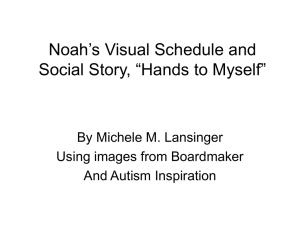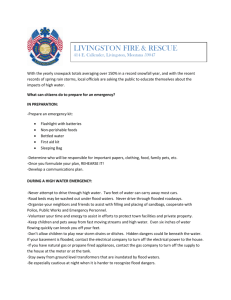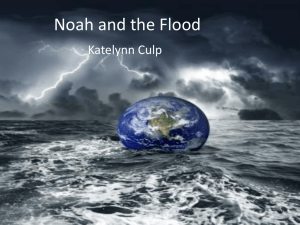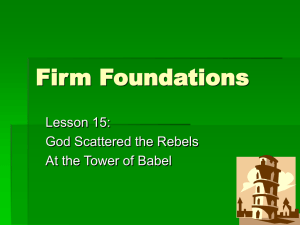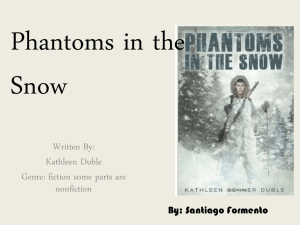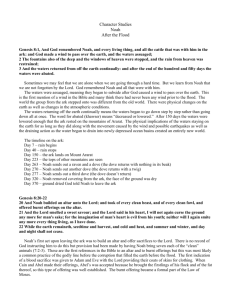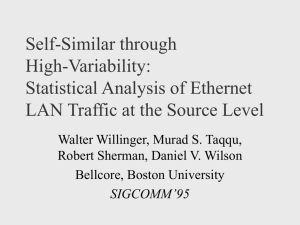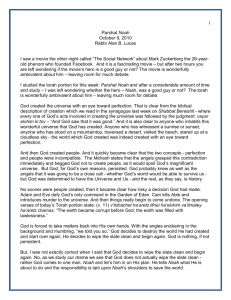God`s promise to Noah
advertisement
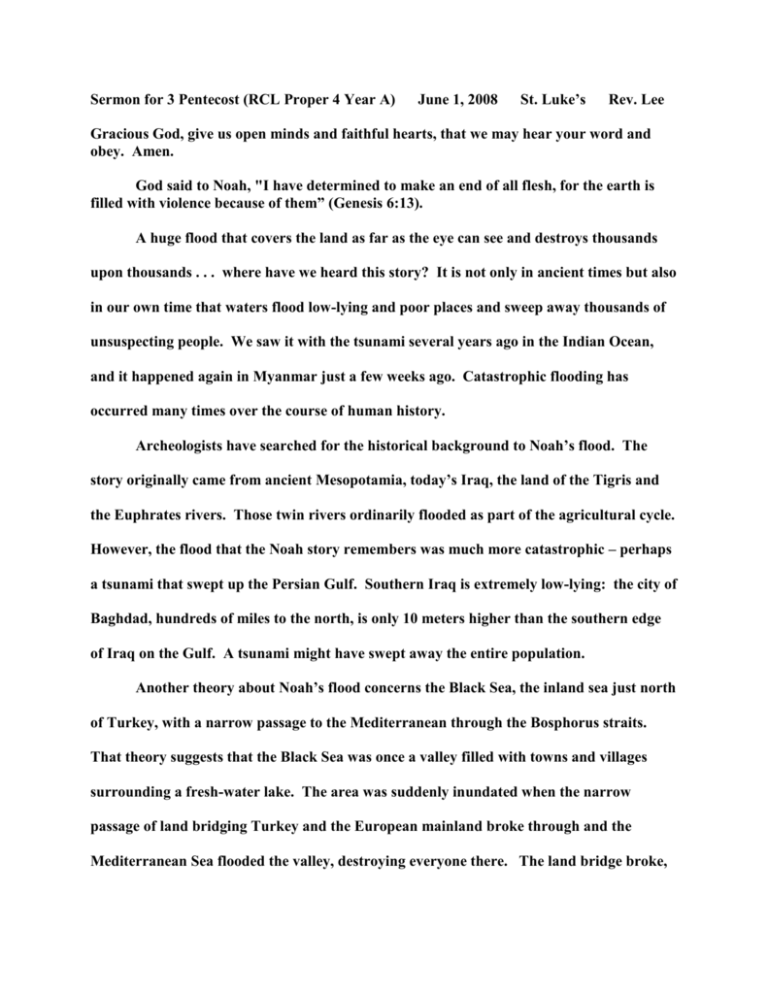
Sermon for 3 Pentecost (RCL Proper 4 Year A) June 1, 2008 St. Luke’s Rev. Lee Gracious God, give us open minds and faithful hearts, that we may hear your word and obey. Amen. God said to Noah, "I have determined to make an end of all flesh, for the earth is filled with violence because of them” (Genesis 6:13). A huge flood that covers the land as far as the eye can see and destroys thousands upon thousands . . . where have we heard this story? It is not only in ancient times but also in our own time that waters flood low-lying and poor places and sweep away thousands of unsuspecting people. We saw it with the tsunami several years ago in the Indian Ocean, and it happened again in Myanmar just a few weeks ago. Catastrophic flooding has occurred many times over the course of human history. Archeologists have searched for the historical background to Noah’s flood. The story originally came from ancient Mesopotamia, today’s Iraq, the land of the Tigris and the Euphrates rivers. Those twin rivers ordinarily flooded as part of the agricultural cycle. However, the flood that the Noah story remembers was much more catastrophic – perhaps a tsunami that swept up the Persian Gulf. Southern Iraq is extremely low-lying: the city of Baghdad, hundreds of miles to the north, is only 10 meters higher than the southern edge of Iraq on the Gulf. A tsunami might have swept away the entire population. Another theory about Noah’s flood concerns the Black Sea, the inland sea just north of Turkey, with a narrow passage to the Mediterranean through the Bosphorus straits. That theory suggests that the Black Sea was once a valley filled with towns and villages surrounding a fresh-water lake. The area was suddenly inundated when the narrow passage of land bridging Turkey and the European mainland broke through and the Mediterranean Sea flooded the valley, destroying everyone there. The land bridge broke, the theory goes, due to the melting of the glacial ice cap at the end of the Ice Age. The sea level rose around the globe, spilling over the land bridge into the Black Sea area. The same glacial melting would have flooded low-lying areas around the world, such as the Tigris and Euphrates river valley. As scientists tell us today in studies of global warming, the populations most affected are those that live on the water’s edge, in low-lying areas, often impoverished populations such as those in the Irriwaddy delta in Myanmar. In Noah’s time, most everyone would have lived near the water, so the rising of the sea level would have affected the whole world. Whatever the historical basis of the story, ancient peoples tried to make sense of catastrophic flooding. The Babylonians first came up with the story of the family that escaped in a large boat, and the Hebrew people developed their own version, relating the catastrophe to God’s relationship with the human race. In the Biblical story, we see God’s judgment and God’s mercy set side by side. Generations after Adam and Eve, the human race had become corrupt, evil, and full of violence, and God regreted having created humankind. He determined to wipe them all out – that’s God’s judgment on his own creation. But God also had mercy - - on the one good man he could find, Noah, the one who obeyed God, and God also spared Noah’s wife and sons and daughters-in-law. When the waters finally receded, humanity had a chance to start over. The lesson today doesn’t give us the end of the story. God promised Noah that he would never again send a flood to destroy all living things. As a sign of the promise, God hangs up his war bow, his mighty weapon, and sets aside his judgment. The war bow becomes the rainbow, a shimmering sign of God’s mercy. The passage ironically notes that God realized humans are full of evil and likely to commit violence again. But God promised never again to punish the earth and all its living creatures because of the violence of humanity. The Noah story developed probably some 4-5,000 years ago. We can ask today, how are things going with humanity and violence? Are we any less corrupt? Have we learned any lessons? I think we can say, the evidence is not good! Violence and corruption are still very much a part of human life. We have the capability of violence on a much greater scale than ever before, and the race for riches goes on unabated. We have changed the face of the planet in ways that Noah’s generation could not even dream of. It’s easy to imagine that God may not be pleased! And still, God withholds punishment, as promised. The rainbow still shines. Instead of massive destruction at the hands of an angry God, we have the example and teaching of Jesus, the obedient one who pursued God’s will whatever the cost. We could say that God went to “Plan B” – rather than sending catastrophe, God calls to us in the still small voice, in the words of Jesus, in the voice of conscience. Jesus gives us a non-violent way, the way of love, the way of service. Don’t worship money, Jesus taught. Put God first, and then care about people. Instead of building our lives on shifting sand, vulnerable to the flood, Jesus tells us to build our lives on solid rock, faith in God’s goodness and service to God. When everything else washes away, the love of God endures. Let us pray. Gracious God, you created a good world, and we have corrupted it. We deserve your righteous anger. But have mercy on us and help us to walk in your way of love and service, that all your children may be safe and cared for; through Jesus Christ our Lord. Amen.
